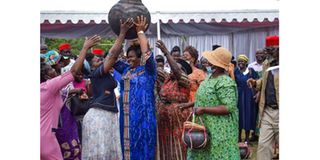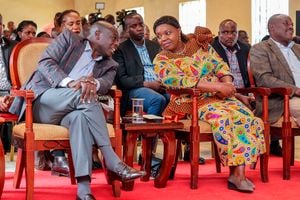Sis, fix a sister’s crown

Karachuonyo women help Homa Bay Woman Representative Gladys Wanga carry a pot, one of the luo traditional artefacts she was given when she was endorsed to vie for Homa Bay governor at Karabondi Secondary School on December 30, 2021.
What you need to know:
- The year 2017 was one of milestones for Kenyan women’s political participation.
- The next election is four months away and women hope that this time round, the outcome will be a game changer.
- Participation of more women will advance gender equality and affect both the policies considered and the solutions proposed.
There is a belief that women in leadership positions should act as catalysts for other women to rise through the ranks.
However, does the reality on the ground support this notion?
The year 2017 was one of milestones for Kenyan women’s political participation.
The next election is four months away and women hope that this time round, the outcome will be a game changer.
Studies show that a legislator’s gender has a distinct impact on their policy priorities.
Gender equality
Participation of more women will advance gender equality and affect both the policies considered and the solutions proposed.
Madeleine Albright, the first female US Secretary of State who died last week, once said, in regard to women in power, “they can be counted on to raise issues that others overlook, support ideas others oppose, and seek an end to abuses that others accept.”
However, as we attempt to achieve this, a handful of women act as inhibitors to the inclusion of fellow women to leadership, influence and power.
The enemy within
A recent video of a woman aspirant asking her female competitors whether they were married or not, was in bad taste. “Nyiswa chuori (show us your husband),” she said.
The implication was that a woman cannot make a good leader if she is unmarried; that electorates should not vote for a woman unless she displays her husband.
Her statement plays to gender stereotypes that have marginalised women for years. It is worse that it came from a woman.
Then news broke of Ms Albright’s death and I recalled another statement she once made – “There is a special place in hell for women who don’t help other women.”
Under-representation
It has been 27 years since the Beijing Declaration and Platform for Action set the international target for reaching gender equality in political decision-making. Despite little progress, however, women are still underrepresented.
A 2019 global study by the Inter-Parliamentary Union (IPU) ranks Kenya 90th out of 193 countries in terms of women’s representation in Parliament.
They are still facing myriads of roadblocks in their pursuit of political roles, including patriarchy, lack of resources, societal stereotypes, insecurity and gender-based humiliation and violence.
Political affiliation aside, women must support each other if they are to win.
To be fair, most female politicians send the elevator back down to fetch fellow women, especially the young ones who are marginalised because of age and pre-existing gender barriers.
Future generations at stake
Data on youth participation in parliaments from IPU show that only 2.2 per cent of parliamentarians are under 30, and less than one per cent are women.
Exclusion of this demographic from governance undermines their valuable contributions for future generations.
Their representation is critical in the development of inclusive, responsive, and transparent democracies.
Their best cheerleaders should be women through the ‘Queendom Party’ where we only fix each other’s crowns.
Meanwhile, remember that we cannot succeed in solving our country’s problems without men’s support.
Vote in a queen in August, won’t you?





